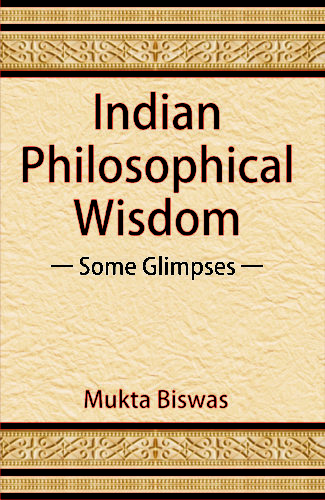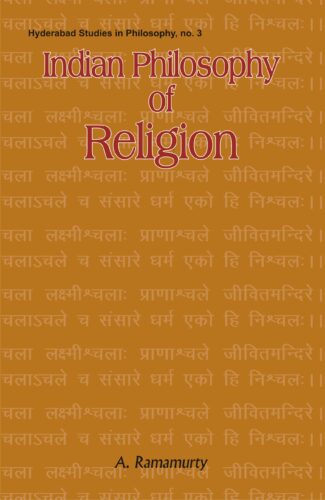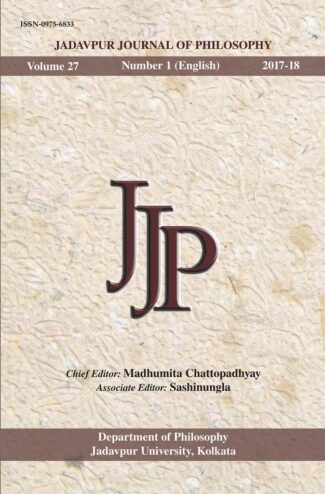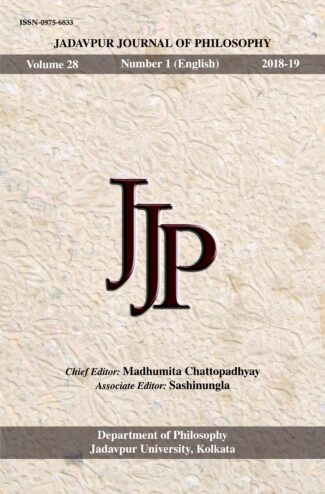Showing 91–100 of 294 results

The title of the book Indian Philosophical Wisdom: Some Glimpses itself signifies its importance. Indeed, philosophy is involved in every sphere of human life — literature, creative art, culture, etc. The author in her zeal to unravel the precious accumulated wisdom of Indian philosophy delved in its treasure with different approaches — historical, analytical, comparative, etc. An attempt has been made in this book to expound Indian philosophical systems and to analyse critically their logical implications.
The title of the book Indian Philosophical Wisdom: Some Glimpses itself signifies its importance. Indeed, philosophy is involved in every sphere of human life — literature, creative art, culture, etc. The author in her zeal to unravel the precious accumulated wisdom of Indian philosophy delved in its treasure with different approaches — historical, analytical, comparative, etc. An attempt has been made in this book to expound Indian philosophical systems and to analyse critically their logical implications.
This work consists of twenty-seven articles both unpublished and published in journals and from different academic forums aimed towards making a documentation of discussions on various systems of Indian philosophy, Upaniṣadic and Yoga philosophy in particular. This could be a ready reckoner on the subject for young and enterprising students and scholars who possess innate inquisitiveness to unearth the sagacity enshrined in Indian philosophy.

The book presents a comprehensive account of the six Indian classical systems and the Carvakas, and of their texts and their exponents. Unfolding a panorama of the Hindu divinities, it also discusses Jainism and Buddhism as religions and philosophies.
In India, philosophy and religion are linked intimately, inseparably. Barring the Carvakas materialistic school, every other school has concentrated not just on the spiritual way of life in the here-and-now, but on the eventual spiritual salvation of man in relation to the universe. However, notwithstanding the centrality of its spiritual concerns, Indian philosophy has not altogether glossed over materialism; rather it has known it, overcome it, and has accepted idealism as the only tenable view -whatever specific form that idealism might take: mythological, popular or technical. Offering a brilliant prefatory discussion on the nature and thematic importance of the Vedas, the Upanishads, and the Bhagavad Gita, Padhis book tries to capture Indias fabulous philosophic genius, with comprehensive, at once objective account of all the six classical systems: the Nyaya, the Vaisheshika, the Samkhya, the Yoga, the Purva Mimamsa, and the Vedanta; and, in addition, of the Carvakas: the crass materialists. And of their numerous texts and their exponents: classical, medieval, and modern. Also unfolding a panorama of the Hindu pantheonic divinities, the authors present Jainism and Buddhism: both as religions and philosophies -with focus on their world- views of ethics, major doctrines and significant metaphysical theories, among other aspects. Uninfluenced either by the idealistic/eulogistic studies of certain Indian scholars, or by the damaging critiques of their Western counterparts, the authors aim to achieve utmost objectivity in their presentation. Which, together with extensive bibliographic references and glossary of Sanskrit terms, makes the book an authentic guide for the discerning readers of Indian philosophy, religion and mythology.

The book presents the understanding of different Indian philosophers on some of the basic problems of religion. Considering diverse schools and systems of Indian philosophy, it examines the significance of the arguments presented by the philosophers for grasping the relevance of religious theories and concepts. In the process, it reformulates some of them to make them less technical.
This is work in a significant area of Indian philosophy on which very little work has been done. Most of the Indian philosophers, to whatever school or tradition they belong, have shown concern for understanding the basic claims of religion and for most of them the problems of religion are those that are generated by shruti tradition of Hinduism. Instead of taking any philosophical position in approaching and understanding the problems of religion, this work tries to be comprehensive, and seeks to present and discuss the understanding of different Indian philosophers of some of the basic problems of religion. The arguments presented in this work are taken from different schools or systems of Indian philosophy, and in certain cases they are reformulated to make them less technical. This book will be of immense use to both the students and researches in Indian philosophy of religion and also to general readers.

The book is an analytical study of the philosophy of Sri Aurobindo with special reference to his ideas on socio-political issues, nationalism, morality and stateless society besides the dangers of imposed uniformity with disregard for difference.
The book is an in-depth study of the integral philosophy of Sri Aurobindo. It throws light on his fundamental ideas on socio-political issues and concepts relating to Yoga and knowledge. The well researched writings pointedly examine Sri Aurobindos views on nationalism, Western imperialism, morality, stateless society, human relations and education among other such subjects. Quoting liberally from Sri Aurobindo the volume delves deep into his understanding of the divine and the human; the nation as characterized by spirituality; and spiritual transformation relying on the brotherhood of all humans as multiple expressions of the same godhead. His philosophy of integral monism and the way Aurobindo makes frequent references to Hindu scriptures: the Vedas, the Upanishads and the Puranas has been highlighted in particular. How Sri Aurobindo stresses throughout on the dangers of imposed uniformity with total disregard for difference has been brought into focus.
Based on an analytical study of Sri Aurobindos philosophy and offering fresh approaches, the volume will interest both, the students and scholars of modern Indian philosophy and Indology in general.
In the context of current knowledge situation, when every discipline has something to contribute to interdisciplinarity, it seems quite apposite and opportune that philosophy should reinforce and reassert its traditionally cherished role of integrating human knowledge. The Book at hand is an attempt to that end. It is set to take the readers on an enthralling journey across disciplinary boundaries and inspire them to reach a comprehensive conceptual framework for human knowledge at large.
The book delves into the idea and the philosophy of interdisciplinarity, and then unravels the genealogy, dynamics, and myriad configurations of the highly complex phenomenon. It goes on to assess impact, advantages and critical issues involved in interdisciplinarity, while outlining an Indian view of it. The book, thus, explores the conceptual connections, fundamental issues and intrinsic implications of a myriad variety of interdisciplinary study and research, within and beyond academia. The book also attempts to develop necessary theoretical perspectives and a broader conceptual framework in this connection. Ultimately, it seeks to reach, as far as possible, a systematic conceptual account of varied and variegated interdisciplinary studies and researches by integrating them philosophically.
The present work is thus, intended for a wider audience, and not only for the practitioners of philosophy as an academic discipline. It is a must read across the intellectual spectrum, regardless of one’s disciplinary affinities and affiliations. It is wide-ranging in its concerns, far-reaching in implications, and highly resourceful and relevant for generalists as well as specialists, scholars and scientists, researchers and curriculum developers, educational administrators and policy-makers.

This innovative reading of Patanjalis Yoga-sutras discuss how Yoga enables one to live more fully in the world without being enslaved by worldly identification. It challenges misperception about Yoga and argues for a fresh understanding of the practical relevance of Yoga.
The Integrity of the Yoga Darshana centres on the thought of Patanjali, the great exponent of the authoritative and Classical Yoga school of Hinduism and the reputed author of the Yoga-sutras. In this textual, historical, and interpretive study, whicher offers a plausible and innovative reading of the intention of the Yoga-sutras, namely that Yoga does not advocate the abandonment or condemnation of the world, but rather supports a stance that enables one to live more fully in the world without being enslaved by worldly identification. Challenging and correcting misperceptions about Yoga drawn by traditional and modern interpretations of the Yoga-sutras, the author argues for a fresh vision of the spiritual potential present in this seminal text, thereby contributing to our understanding of the meaning and practical relevance of Yoga and its reception today. A superb piece of work, this book provides an original, constructive, and insightful interpretation of the Yoga system.
The book investigates the bhakti beliefs and practices of the subaltern Kabirpanth community in comparison with the nirguna bhakti thought of their guru, the medieval iconoclastic bhakti saint Kabir. By doing so, the book attempts to investigate the Kabirpanthis’ attempt at dissent and submissiveness vis-a-vis the dominant Sanskritic Hindu tradition. This dual strategy of dissent and submissiveness is analysed through subaltern postcolonial lens as well as by employing social anthropological empirical research.
The book begins by making an analytical study of the medieval Bhakti movement and the nirguṇa bhakti teachings and practices of Kabir. Using postcolonial discursive tools such as postcolonial mimicry, ambivalence and hybridity, the author investigates how the bhakti beliefs and practices of the subaltern Kabirpanth community are elements of subversive and resistance stance against the dominant Sanskritic Hindu tradition.
This book is a must read for anyone interested in bhakti religion and movement and those who wish to analyse subaltern religion through postcolonial lens.
The book investigates the bhakti beliefs and practices of the subaltern Kabirpanth community in comparison with the nirguna bhakti thought of their guru, the medieval iconoclastic bhakti saint Kabir. By doing so, the book attempts to investigate the Kabirpanthis’ attempt at dissent and submissiveness vis-a-vis the dominant Sanskritic Hindu tradition. This dual strategy of dissent and submissiveness is analysed through subaltern postcolonial lens as well as by employing social anthropological empirical research.
The book begins by making an analytical study of the medieval Bhakti movement and the nirguṇa bhakti teachings and practices of Kabir. Using postcolonial discursive tools such as postcolonial mimicry, ambivalence and hybridity, the author investigates how the bhakti beliefs and practices of the subaltern Kabirpanth community are elements of subversive and resistance stance against the dominant Sanskritic Hindu tradition.
This book is a must read for anyone interested in bhakti religion and movement and those who wish to analyse subaltern religion through postcolonial lens.

Jadavpur Journal of Philosophy is a refereed, bi-issue journal, in English (No. 1) and Bengali (No. 2) published annually by the Department of Philosophy, Jadavpur University, Kolkata, India. The journal volume in Bengali is titled Darsan Biksa. The journal is devoted to the publication of original scholarly papers in any branch of philosophy. Its objective is to encourage contributions from scholars, dealing with specific philosophical problems connected with their respective fields of specialization.
Jadavpur Journal of Philosophy is a refereed, bi-issue journal, in English (No. 1) and Bengali (No. 2) published annually by the Department of Philosophy, Jadavpur University, Kolkata, India. The journal volume in Bengali is titled Darsan Biksa. The journal is devoted to the publication of original scholarly papers in any branch of philosophy. Its objective is to encourage contributions from scholars, dealing with specific philosophical problems connected with their respective fields of specialization.

Jadavpur Journal of Philosophy is a refereed, bi-issue journal, in English (No. 1) and Bengali (No. 2) published annually by the Department of Philosophy, Jadavpur University, Kolkata, India. The journal volume in Bengali is titled Darsan Biksa. The journal is devoted to the publication of original scholarly papers in any branch of philosophy. Its objective is to encourage contributions from scholars, dealing with specific philosophical problems connected with their respective fields of specialization.
This book proposes to take up the question of Universal Causation to examine thoroughly as how far it is right to regard Brahman as the Universal Cause and how far strakra himself lent his support to each of the inter-conflicting schools of Vednta. This book should, therefore, benefit all who are devoted to the philosophic teachings of Advaita Vednta and its preceptors.
| There are no products |